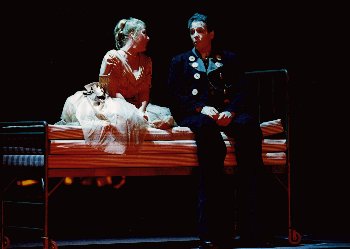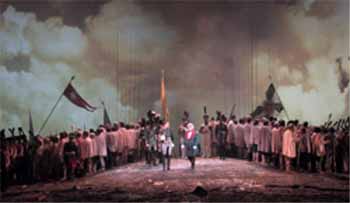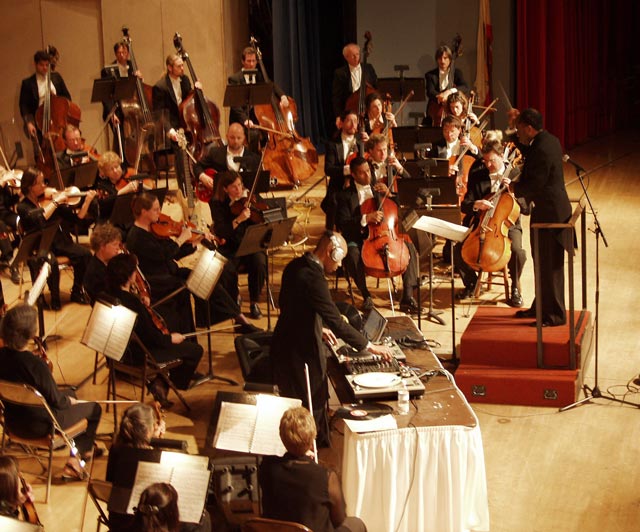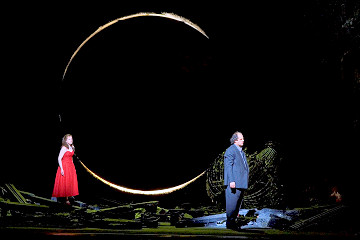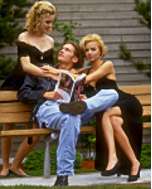Anglophile And Russophile Classical WETA-FM Continues To Deepen Classical Music Mini-Crisis In America; Baltimore Symphony Rushing To Rescue
Please write to WETA Chairman Sharon Percy Rockefeller and demand that Classical WETA-FM Radio contain one-tenth to one-fifth as much American classical music content as WETA-TV contains American television and film content! Demand that the intellectual task of preparing Classical WETA-FM playlists -- for which Classical WETA-FM is currently unqualified -- be turned over to the classically-trained staff of the Library of Congress Music Division for a transitional period of at least one-year!
Sharon Percey Rockefeller
CEO & President
WETA
2775 South Quincy St.
Arlington, VA 22206
tel 703.998.2600
*
Wednesday, March 7 at 7:00 pm -- LOUIS C. ELSON MEMORIAL LECTURE
THE CLASSICAL MUSIC "CRISIS" AND WHAT TO DO ABOUT ITby Joseph Horowitz (no tickets required) Library of Congress
"Joseph Horowitz, author of Classical Music in America: A History of Its Rise and Fall (2005) and artistic director of Washington’s Post-Classical Ensemble, traces the decline of classical music in this country and suggests ways to revitalize it. It will be followed by a discussion and Q&A with musicologist Karen Ahlquist, George Washington University, and Christina Sheppelmann, artistic administrator, Washington National Opera."
Performances and Lectures at the Library of Congress, 2006-07
Shouldn't Sharon Percy Rockefeller also be on this panel attempting to justify her ways of raising and using private contributions and public funds to hinder the development of American classical music culture?
*
"RADIO is our most intimate medium — it wakes us in the morning, follows us into the shower, accompanies us during commutes and becomes a lifeline in emergencies. But radio is struggling to attract and retain an audience.
Today in Congress, the executives from XM and Sirius who propose merging into a $13 billion satellite monopoly will argue that consolidation offers the best hope for reviving radio. Traditional broadcasters also favor consolidation. In October, the National Association of Broadcasters asked the Federal Communications Commission to relax ownership limits in local markets, so companies could control yet more stations per town.
But does anyone believe that consolidation has been good for radio? During the past five years, I’ve traveled the country asking people to describe what has happened to their local stations, and not one has told me that radio is better than it was a decade ago. Listeners complained that their favorite local D.J.’s, talk show hosts and reporters have disappeared, replaced by syndicated shows, automated programs, predictable song cycles and endless commercials.
Before the Telecommunications Act of 1996, which allowed a company to own up to eight radio stations in a single market and an unlimited number nationwide, one could hear the sounds of Chicago, Philadelphia, New Orleans and Seattle through their local radio stations. Today, big-brand stations dominate the dial coast to coast. Radio no longer makes our hometowns feel like home.
Satellite radio companies grew during the 1990s by delivering refreshingly uninhibited content, mostly commercial-free. Although terrestrial broadcasters prevented XM and Sirius from providing local news and programming, the “satcasters” attracted more than 13 million paying customers." ...
Eric Klinenberg "Saving Radio in the Satellite Era" New York Times February 28, 2007
http://www.nytimes.com/2007/02/28/opinion/
28klinenberg.html?pagewanted=print
*
Baltimore Symphony Orchestra Celebrates A Living Classical Music Culture in America!
"We’re calling it a season, but it’s really more of an adventure. A musical adventure conducted by a deeply knowledgeable and accessible tour guide we’re proud to have as our new Music Director. Maestra Marin Alsop brings a masterful technique, unsurpassed musical credentials, and boundless energy and creativity to the BSO and to the Baltimore/Washington area. She has the uncanny ability to make the classic and the new equally relevant and exciting to you. World-class orchestra meets brilliant conductor.
Your Grammy Award-winning Baltimore Symphony Orchestra has truly earned its place among the world’s most respected orchestras. Its electrifying performances have brought critical acclaim and a devoted following locally, nationally and
internationally. Adding Maestra Marin Alsop to such an accomplished group of musicians raises the artistic bar to even greater heights.
Something classic. Something contemporary. Something for everyone.
From the symphonies of Beethoven to the works of living composers, Marin Alsop and the BSO bring it all to life. The season opens with the perfect combination of two extremely powerful works, one classic, Mahler’s Fifth Symphony, and one contemporary, John Adams’s Fearful Symmetries. And the excitement builds from there with star-studded guest soloists including pianists Garrick Ohlsson and André Watts, violinist Nadja Salerno-Sonnenberg, Pops favorite Michael Feinstein and folk legend Art Garfunkel. Star Trek’s Mr. Sulu, George Takei, and the BSO SuperPops bring you a Sci-Fi Spectacular, while the Charlie Chaplin film City Lights gets a new twist with live accompaniment from the orchestra. And of course, there are the great classics. From Bach to Brahms, Mozart to Mendelssohn, Dvoˇrák and beyond.
Composers put down the pen and pick up the baton.
The 2007-2008 season brings you modern-day masters, with the works of 11 living composers, five of whom will be conducting their own compositions and all of whom will be discussing them. They’ll join Maestra Alsop onstage after the concert for
one-on-one conversations with the audience during our new Q&Alsop. It’s wonderful to admire a great piece of music. But it’s truly a great opportunity to delve into the context of the music and ask a composer, “What was the inspiration for that
passage?” It’s like hearing Beethoven’s personal take on the famous first four notes of his Fifth Symphony."
Baltimore Symphony Orchestra 2007-08 Season Featuring Eleven Major Works By Living Composers
Sarmatian Winged Horsemen and Winged Horsewomen rushing to the Gates of Western and American Classical Musical Culture in order to prevent it from being taken over by WETA-FM's Republocrat troops of classical music hucksters.
Photo credits: www.russellhooverstudios.com and Wikipedia Commons. With thanks.


.jpg)

